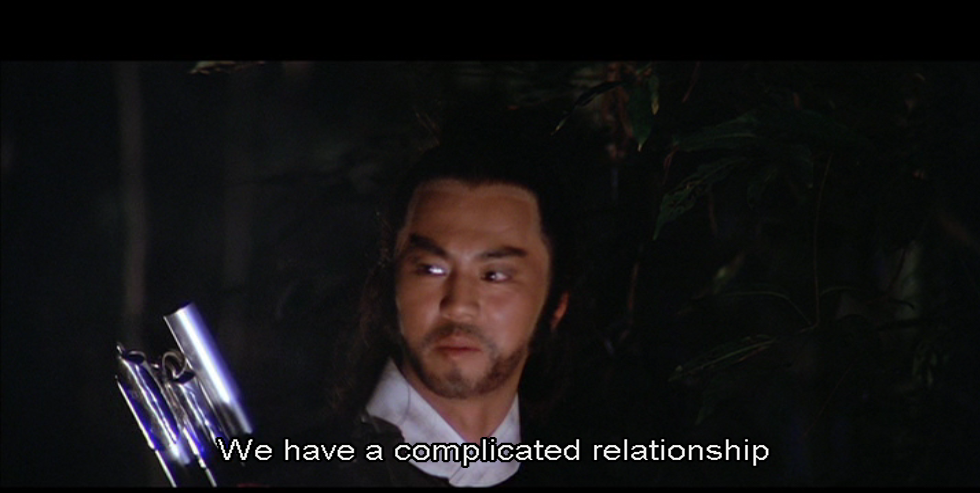Movie Review: The Avenging Eagle (1978) directed by Chung Sun
Homeless (Sheng Fu) sees a man dying of thirst in the desert, and stops to give him water. This man, Rover (Ti Lung), repays Homeless by stealing his horse and supplies. Fortunately, it turns out there is an oasis not too far away, and when Homeless catches up, Rover returns his stolen goods. The two are then attacked by members of the Iron Boats gang, who are after Rover. The enemy assumes that the two wanderers are working together, so Rover and Homeless must temporarily ally. Afterwards we begin to learn Rover’s backstory.

Yoh Xi-Hung (Feng Ku), leader of the Iron Boats, had purchased a large number of orphans some twenty years ago and trained them as his fanatical kung fu warriors. He weeded out those that were disobedient, compassionate, weak, unable to learn kung fu, or had other flaws. Only thirteen survived to adulthood, the elite unit known as the Thirteen Eagles. Rover was one of them as Black Eagle Chi Ming-Sing. He would do any task for Yoh, no matter how vile or criminal, but mostly it was stealing and killing.
During one mission, Chi was so badly injured that he passed out before he could return to the Iron Boats’ hideout. He was found by a kindly passer-by and tended by that man’s family. During the two months he spent with the family, Chi witnessed normal life for the first time and realized how warped his upbringing actually was. He also fell in love with Miss Fung, the first woman he’d ever had actual conversations with, who urged him to become a better person.
Recovered, Chi returned to the Iron Boats. While his reception was at first joyous, his changed attitude was noticed and planted seeds of suspicion in Yoh’s mind. And it turned out that the kindly passer-by was one of Yoh’s old enemies, so the Thirteen Eagles rode out and killed the entire family, including Miss Fung. Chi was not happy, but was still loyal to Yoh…until the boss decided to have him commit an atrocity as a loyalty test. Chi did this, but then fled the Iron Boats at the earliest opportunity. Which brings us to the present.
Homeless points out that since he helped kill the first few Eagles that were sent against Chi, separating from the fleeing gang member won’t actually protect him. And also, he is totally down for killing bandits, so suggests being Chi’s ally until the Iron Boats are defeated. Chi reluctantly agrees. But just who is Homeless anyway, and what’s his real goal?
This movie is a Shaw Brothers “historical” epic; I don’t know enough about Chinese history to spot the actual time period, but historical accuracy is not something that’s expected here.
Good: The kung fu is stylish and there are numerous good combat scenes. There’s excellent use of color schemes and unique weapons to help the viewer distinguish between the many characters. Ti Lung does a good job of portraying a man who wants not to be evil any more, but hasn’t managed to figure out how to act righteously.
Yoh Xi-Hung is a hissable villain as the abusive father figure of the Thirteen Eagles, who expects absolute loyalty and thinks this is his love for them. He has a great moment towards the end where he manages to manipulate Chi Ming-Sing’s emotions…at least for a while.
Homeless isn’t quite as good as a man who’s hiding his true personality under a facade of levity and carefree attitude. His running into Chi is a coincidence, but not as much of one as Chi initially thinks. The viewer will figure out his identity well before Chi does.
Not as good: Women in this movie are there to be murdered so that the male protagonists can feel bad about it. Most of the twelve other Eagles have little more to do than show up, fight, and die; only a couple get actual one-note personalities.
Odd: The name of the gang and a couple of throwaway lines suggest that the main business of the Iron Boats is piracy, but there are no scenes at sea or involving water vehicles.
Content note: Stylized violence, relatively little blood. Child abuse, emotional abuse, off-screen torture, a pregnant woman is murdered.
Overall: A solid martial arts action film in the Run Run Shaw tradition. A nostalgic treat for folks who grew up watching kung fu movies on independent broadcast channels or early cable TV.

